It was April 16, 1917, when Vladimir Lenin stepped down from the train at the Finland train station in a triumphant return – after 17 years in Swiss exile – to demonstrate the will to power when the might makes it right. “Dear comrades, soldiers, sailors, and workers, I am happy to greet in you the victorious Russian revolution…Not today, but tomorrow, any day may see the general collapse of European capitalism.” That return journey and the catastrophe that followed still haunts the world…
The figure below shows US government debt, and it could be perceived as an excellent example of what is known as “The Tragedy of the Commons”. The overuse and, in several cases, unwise (if not idiotic) use of a stabilization tool (deficit) could potentially undermine economic and financial stability around the world, due – among other reasons – to persistently high interest rates. And this applies to both Republican and Democratic administrations. We simply ignored Aristotle when he warned us, “That which is common to the greatest number gets the least amount of care. People pay more attention to what is their own: they care less for what is common.”
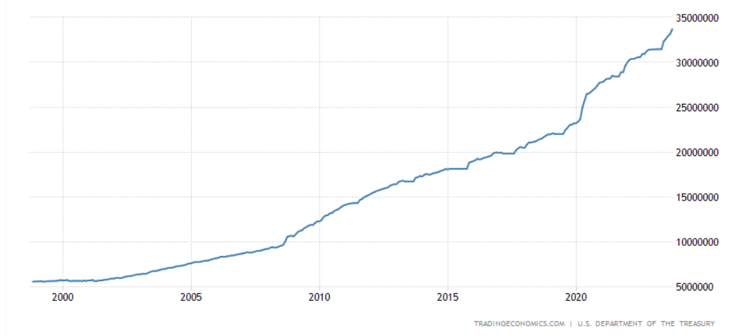
In his latest book titled The Tragic Mind, Robert Kagan writes: “War, even when it is relatively clean, with few or no civilian casualties, and fought by honorable people, is still absolute hell. Only those who have never experienced war have the luxury of advocating it with a clean conscience…to idealize violence is both monstrous and naïve.”
When the Peloponnesian War started (431 BCE), Euripides saw the justness of it due to Spartan militarism. However, as time went by, he grew more and more disillusioned by it. By the time the Athenians committed atrocities and a massacre on the island of Melos (simply because they wanted to remain neutral in that war), Euripides had had enough of his fellow Athenians, especially when the latter declared that the only right rested in military force, and they would simply look weak if they didn’t exercise it. Following the massacre that the Athenians committed, Euripides had no other choice but to write that marvelous play known as Trojan Women.
The market is facing a bifurcated reality, when between August 1st and October 31st the markets (both debt and equity) lost significant ground, while since November 1st both markets have exhibited strength, as shown below:
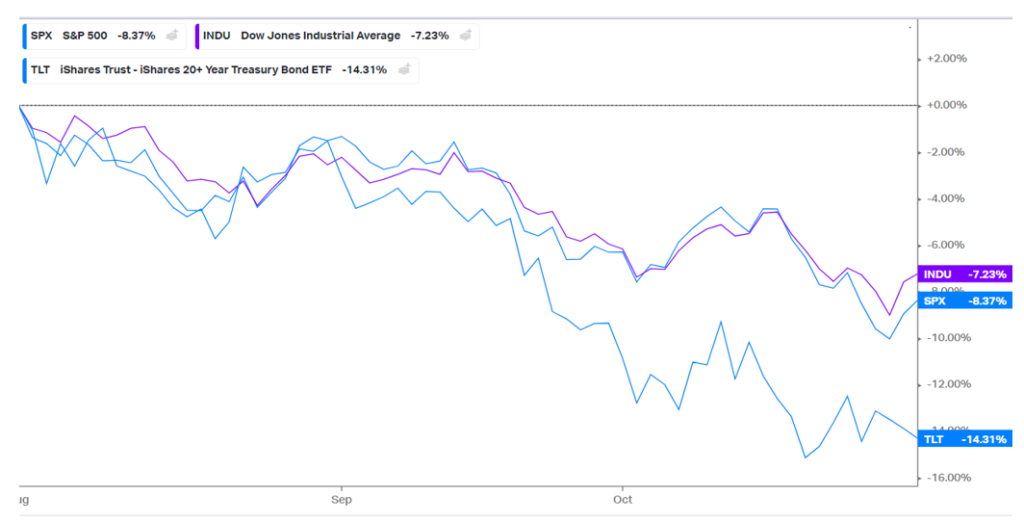
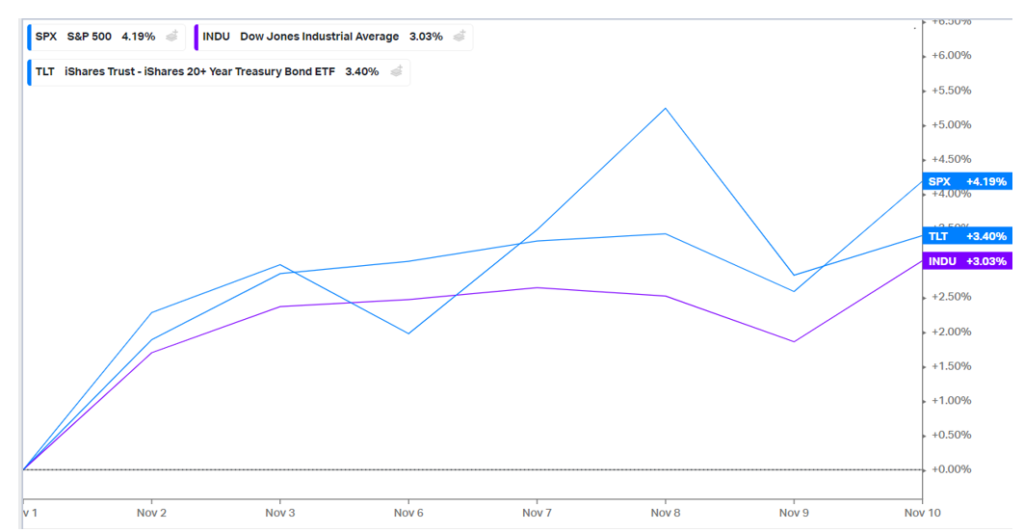
We cannot ignore the fact that such a bifurcated reality has something (if not a lot) to do with the tragedy of the commons and the level of interest rates, as discussed earlier. But even the US economy behaves in such a bifurcated manner, exhibiting strength during a period of consistently declining leading economic indicators.
In Trojan Women, Euripides laments the Athenians’ arrogant and condescending attitude which reached the level of barbarism. Hecuba (the Queen of Troy) witnesses her small grandson being thrown from the walls of Troy to his death. Moreover, she witnesses her daughter and daughter-in-law becoming enslaved concubines of the Greeks, while her other daughter is sacrificed for the cause called “avenging Achilles”. Euripides’ genius at its full extent: his disgust of the Athenians’ behavior is transferred to a scenery 800 years earlier, just in time to remind the Athenians then, and us today, about the reality of human nature. It was time to demystify the Trojan mythical propaganda. It had nothing to do with stoicism, which, as T.S. Elliot taught us, was invented for the slaves.
Where are all those policymakers and intellectuals who advocated for an Iraqi invasion 20 years ago in order to find the weapons of mass deception?
But let’s go back to the bifurcated economic reality: When we take a look at the growth rate of GDP this year (as shown below) we applaud, but when we take a look at the real income growth rate during the same period we are puzzled.
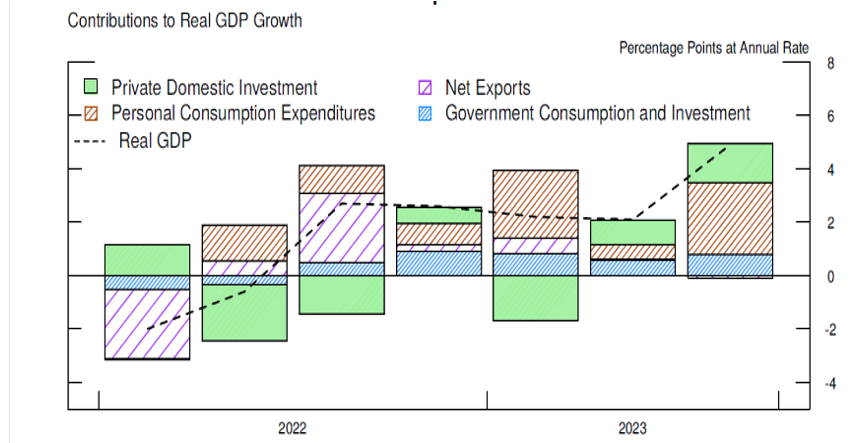
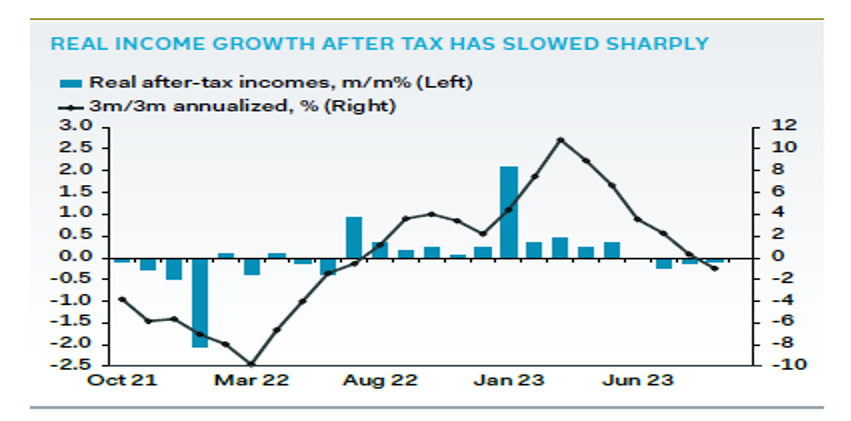
The geopolitical reality that we are experiencing is nothing but a reflection of espousing Nietzschean dogmas of rejecting reason, the distinction between good and evil, science, and the Socratic teachings. For Nietzsche, good and evil are identical in the context of constant flux. The impermanence of everything dictates, according to Nietzsche, the necessity to celebrate the force of the hurricane and the presiding spirit of power and spontaneity. “Everything about Socrates is wrong,” he wrote, and he devoted his life to efforts to overthrow his philosophy. Socrates was the enemy because he had elevated the importance of reason over instinct, teaching people to look to the heavens for the objective truth of how we should live, rather than being content with ceaseless flux.
Moreover, it was Socrates who introduced daemons and the voice of conscience, and for Nietzsche, Socrates was the father of Western decadence, and “he deserved the cup of hemlock.” If the Western world were to recapture the essence of energy and drive to greatness, then according to Nietzsche, all it had to do was to adopt the will to power (the title of his celebrated book). Who had that will to power according to Nietzsche?
The Trojan Homeric heroes who threw babies from the walls of Troy, the German barbarian tribes – those “blond beats” – who destroyed another decadent civilization i.e. the Roman Empire, the Japanese Samurai, Genghis Khan, and the medieval freebooting knight, as they all had led “a disgusting procession of murder, arson, rape, and torture”. And this is because they all exhibited that will to power, which is “the privilege of the strong.” Nietzsche’s call for violence goes far beyond the “noble savages” of Rousseau. For Nietzsche, the call for ceaseless change is a call to historical progress soaked in blood. According to Nietzsche, the founders of great civilizations are “men of prey…still in possession of unbroken strength of will and lust for power, who hurled themselves on weaker, more civilized, more peaceful races.”
A few decades later, an aloof Frenchman by the name of Sorel will present a Gallic version of Nietzsche. For Sorel, before the egalitarian society is built, the old one must be utterly destroyed, including its philosophy of Enlightenment which was nothing else but a reflection of the West’s decadence. Revolution meant unleashing a cleansing and leveling violence which will bring forth an existential Darwinian process that will elevate existence to material conditions and the people’s relationship to the means of production, as people who have “nothing to lose but their chains.” Sorel’s term for that vision was none other than myth. A few years later, Josef Goebbels would give it the name of the big lie. Georges Sorel, based on a pure Nietzschean philosophy, defined the contours of totalitarian politics and enabled Lenin and Stalin to step down from the train that day on April 16, 1917. Somewhere in the distance, and as they were coming down the steps of that train, Lenin and Stalin could foresee another Vladimir putting into practice the Nietzschean philosophy in Ukraine. Hitler would follow too on that route of terrorism based on a big lie.
Is it far-fetched to think that the power exhibited by megacorps nowadays (whether in the tech, financial, energy, or industrial sectors) is a contemporary reflection of the Nietzschean philosophy where the will to power will speak through Zarathustra? If we carefully read the works of Tim Wu and John Coates, we could think that it may not be that far-fetched.
